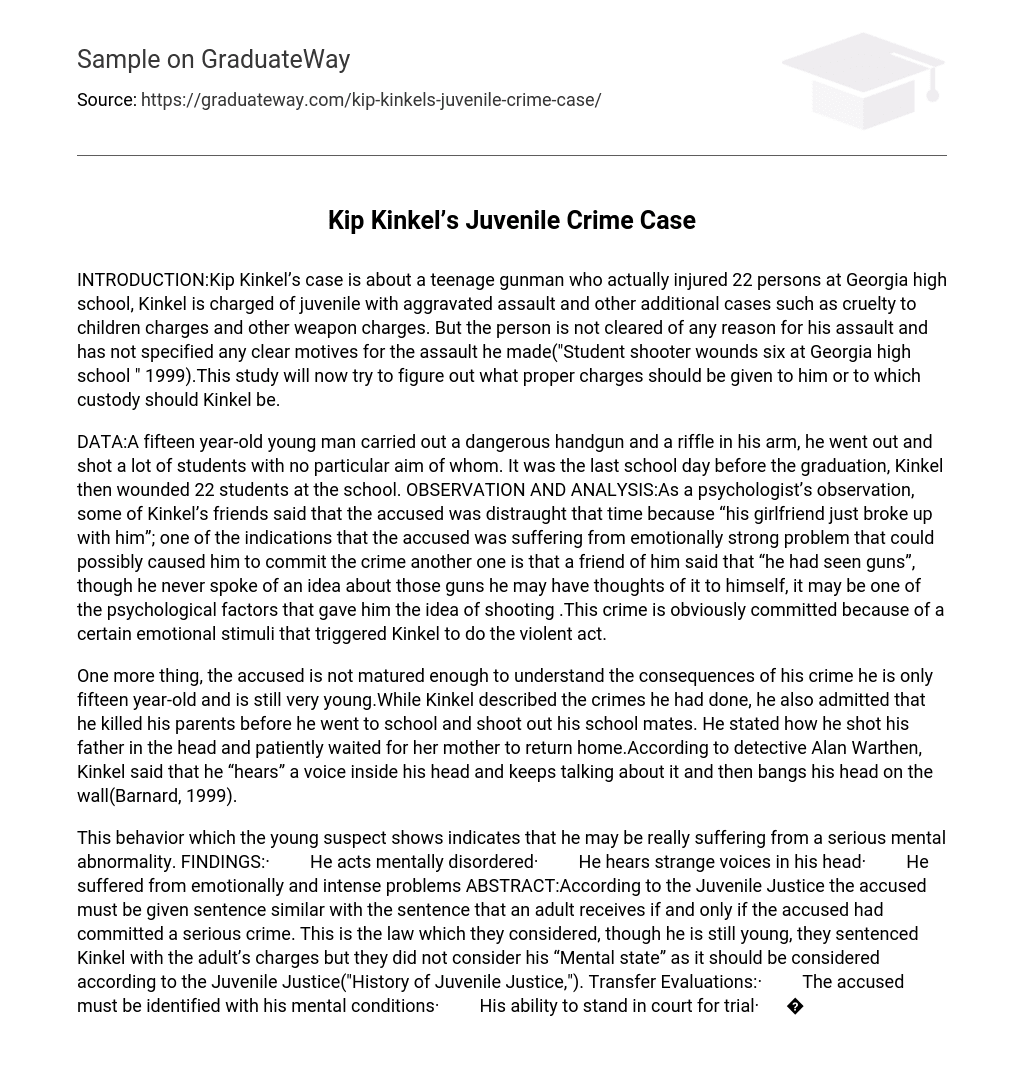INTRODUCTION:Kip Kinkel’s case is about a teenage gunman who actually injured 22 persons at Georgia high school, Kinkel is charged of juvenile with aggravated assault and other additional cases such as cruelty to children charges and other weapon charges. But the person is not cleared of any reason for his assault and has not specified any clear motives for the assault he made(“Student shooter wounds six at Georgia high school ” 1999).This study will now try to figure out what proper charges should be given to him or to which custody should Kinkel be.
DATA:A fifteen year-old young man carried out a dangerous handgun and a riffle in his arm, he went out and shot a lot of students with no particular aim of whom. It was the last school day before the graduation, Kinkel then wounded 22 students at the school. OBSERVATION AND ANALYSIS:As a psychologist’s observation, some of Kinkel’s friends said that the accused was distraught that time because “his girlfriend just broke up with him”; one of the indications that the accused was suffering from emotionally strong problem that could possibly caused him to commit the crime another one is that a friend of him said that “he had seen guns”, though he never spoke of an idea about those guns he may have thoughts of it to himself, it may be one of the psychological factors that gave him the idea of shooting .This crime is obviously committed because of a certain emotional stimuli that triggered Kinkel to do the violent act.
One more thing, the accused is not matured enough to understand the consequences of his crime he is only fifteen year-old and is still very young.While Kinkel described the crimes he had done, he also admitted that he killed his parents before he went to school and shoot out his school mates. He stated how he shot his father in the head and patiently waited for her mother to return home.According to detective Alan Warthen, Kinkel said that he “hears” a voice inside his head and keeps talking about it and then bangs his head on the wall(Barnard, 1999).
This behavior which the young suspect shows indicates that he may be really suffering from a serious mental abnormality. FINDINGS:· He acts mentally disordered· He hears strange voices in his head· He suffered from emotionally and intense problems ABSTRACT:According to the Juvenile Justice the accused must be given sentence similar with the sentence that an adult receives if and only if the accused had committed a serious crime. This is the law which they considered, though he is still young, they sentenced Kinkel with the adult’s charges but they did not consider his “Mental state” as it should be considered according to the Juvenile Justice(“History of Juvenile Justice,”). Transfer Evaluations:· The accused must be identified with his mental conditions· His ability to stand in court for trial· His level of maturity· And the risk that he may harm himself or others.
These are the part of the juvenile law which is not considered in Kinkel’s case(“History of Juvenile Justice,”).Another which is not considered in this crime is stated by Thomas Grisso which noted that an accused person who is under the age of 18 and above could not understand intelligently the Miranda warning as required with the standard level of comprehension(“History of Juvenile Justice,”). In that way, how would a poor young boy defend himself against the crime done? Forensic Evaluation:In this case situation, I therefore state that the accused is “not” with his mental condition, able to stand his self out in the court for a trial. With his mental state, he could not possibly choose whether to plead himself guilty or not because his mind may be in a state of trauma or chaos as to what he have done.
Advice for the defense of how to plead:The defense should not sentence the accused for the said crime during this state.· The young suspect still lacks the ability to comprehend what is currently happening,· and they should consider that the accused is also not in the right state of mind and may not be aware while he was doing the crime done · Also that they should consult the accused into a psychological test to see if he is under a good state of mind condition.(“History of Juvenile Justice,”) Conclusion:Therefore, Kinkel should be admitted in a mental rehabilitation center instead of going directly into jail to avail his sentence to figure out his mental problem and find a way of how to cure it, then after that, if the authority can give assurance that the accused by then is already through his mental disability, then they could reopen the case with the right process and given the proper rights of the accused.At least the accused could then pick his own attorney, state what had really happened, say the real motive why he had done such crime, and or state whether he is to plead guilty or not for the crime accused on him.
With this process, no one will be deprived from any right and the proper means of justice would be given.ReferencesBarnard, J. (1999). Oregon school shooting suspect describes killing on videotapeHistory of Juvenile Justice.Student shooter wounds six at Georgia high school (1999).





